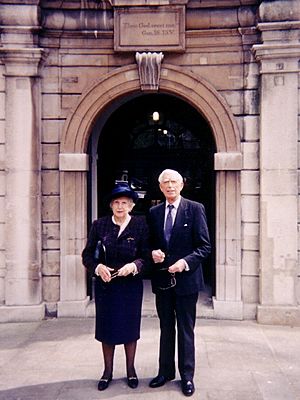Frederick Rosier facts for kids
Quick facts for kids
Sir Frederick Rosier
|
|
|---|---|

Sir Frederick and Lady Rosier outside St Clement Danes (April 1995)
|
|
| Born | 13 October 1915 Wrexham, Wales |
| Died | 10 September 1998 (aged 82) Llangollen, Wales |
| Allegiance | United Kingdom |
| Service/ |
Royal Air Force |
| Years of service | 1935–73 |
| Rank | Air Chief Marshal |
| Commands held | Fighter Command (1966–68) Air Forces Middle East (1961–64) RAF Horsham St Faith (1947–48) RAF Northolt (1944) RAF Aston Down (1943–44) No. 263 Wing (1941–42) No. 229 Squadron (1940–41) |
| Battles/wars | Second World War |
| Awards | Knight Grand Cross of the Order of the Bath Commander of the Order of the British Empire Distinguished Service Order Mentioned in Despatches Commander of the Order of Orange-Nassau (Netherlands) Order of Merit (Poland) |
Air Chief Marshal Sir Frederick Rosier (born October 13, 1915 – died September 10, 1998) was a very important leader in the Royal Air Force (RAF). He was known for his bravery during the Second World War and for his leadership roles after the war.
Contents
Early Life and War Service
Frederick Rosier was born in Wrexham, Wales, on October 13, 1915. His father was a railway engine driver. Fred went to Grove Park School and even played rugby for the North Wales Schoolboys team.
In 1935, he joined the Royal Air Force (RAF). He started flying Hawker Fury planes with No. 43 Squadron. By May 1940, he was a flight commander with No. 229 Squadron RAF, flying Hawker Hurricane planes.
Fighting in World War II
Fred Rosier first saw action during the Second World War in France. He was leading a small group from his squadron near Arras. During a fight, his plane was shot down by an enemy Messerschmitt Bf 109 aircraft, and he got some injuries to his face.
He quickly returned to duty in October 1940. He took command of No. 229 Squadron from RAF Northolt during the last part of the Battle of Britain. This was a very important air battle where the RAF defended the UK from German attacks.
Later, his squadron went to North Africa. Fred led his planes in a risky take-off from a ship, the HMS Furious, flying all the way to North Africa through Malta.
Heroic Rescue in the Desert
In 1941, Fred was promoted to wing commander. He took charge of No. 263 Wing RAF, helping to control fighter squadrons in the desert.
In November 1941, he saw an Australian Tomahawk plane being forced down by enemy fighters. In a very brave move, he landed his own single-seater plane to rescue the pilot. After getting Sergeant Burney safely on board, he tried to take off. However, a tire burst, and his plane crashed. Both Fred and Sergeant Burney then had to walk across the desert for four days, avoiding large enemy patrols, until they reached safety.
Fred Rosier was later given the Distinguished Service Order award for his brave actions over Libya in 1941. He returned to the UK in 1943. He then commanded RAF Aston Down and was also in charge of training new pilots. In 1944, he was given command of RAF Northolt.
After the War
After the war, Fred Rosier continued his important career in the RAF. In 1947, he became the Officer Commanding RAF Horsham St Faith. He also spent time working with the United States Air Force in 1948.
He held many senior positions, including:
- Instructor at the Joint Services Staff College (1950)
- Group Captain Operations at Central Fighter Establishment (1952)
- Group Captain Plans at RAF Fighter Command (1954)
- An Aide-de-Camp (a personal assistant) to Queen Elizabeth II (1956)
In 1958, he became Director of Joint Plans at the Air Ministry. He then led the Air Forces Middle East from 1961 to 1964. His last major roles included leading RAF Fighter Command from 1966 to 1968 and serving as Deputy Commander-in-Chief for Allied Air Forces Central Europe in 1970.
In 1972, he was given the high honor of being made a Knight Grand Cross of the Order of the Bath. He retired from the RAF the next year.
Retirement Life
After retiring from the RAF, Sir Fred Rosier worked as a Military Advisor. He was also a director at the British Aircraft Corporation until 1977. Later, he became the director in charge of the company's work in Saudi Arabia.
He was also the Chairman of the Polish Pilots Benevolent Fund. For his work, he received the Polish Order of Merit in 1998.
In his final years, he lived near Llangollen in Wales.
Family Life
Sir Fred Rosier married Hettie Denise Blackwell in 1939. They had three sons and one daughter.
 | Charles R. Drew |
 | Benjamin Banneker |
 | Jane C. Wright |
 | Roger Arliner Young |

